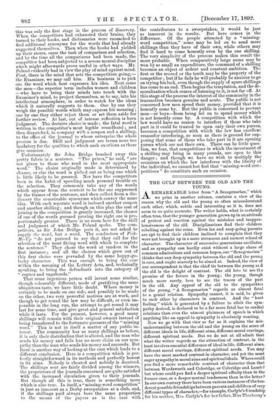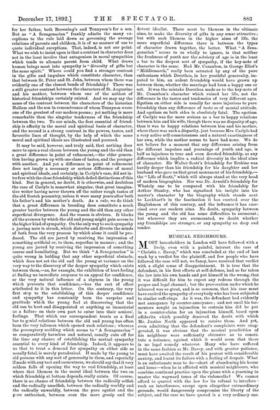THE GULF BETWEEN THE OLD AND THE YOUNG.
AREMARKABLE letter from "A Sexagenarian," which we print in another column, contains a view of the reason why the old and the young so often misunderstand each other, which, subtle and interesting as it is, does not seem to us quite accurate. The writer holds, what is certainly often true, that the younger generation grows up in an attitude of protest and reaction against the mistakes and inappre- hensiveness of the old. Disciplinarians find their children rebelling against the reins. Even lax and easy-going parents are apt to find their children inclined to complain that they were not brought up in a more strenuous and earnest school of character. The character of successive generations oscillates, and as sympathy can hardly exist without a large share of common admirations and common hopes, our " Sexagenarian " thinks that any deep sympathy between the old and the young is rare, and ought scarcely to be aimed at. Indeed, the view of our correspondent is that the chief tie between the young ar d the old is the delight of contrast. The old love to see the promise of the future in the young; the young, though much more rarely, love to see the traces of the past in the old. Any appeal of the old to the sympathies of the young, " A Sexagenarian " regards as almost fatal to a genial relation. Sympathy cannot, it is said, be given to each other by characters in contrast. And the " hurt feeling" which is generated by a failure to elicit the sym- pathy desired, is declared to be a far more fatal bar to cordial relations than even the utmost plainness of speech in which anything like an appeal to sympathy is absolutely wanting.
Now we go with that view so far as it explains the mis- understanding between the old and the young on the score of different ideals in life, different aims, different moral cravings, different spiritual needs. But we do not at all admit that what the writer regards as the attraction of contrast, in the least involves essential difference of ideal in life, different aims, different moral cravings, different spiritual needs. You may have the most marked contrast in character, and yet the most eager sympatbyin moral aims and spiritual ideals. Where could you find a more remarkable contrast of character than that between Wordsworth and Coleridge, or Coleridge and Lamb ? but where could you find a deeper spiritual affinity than in the former case, or a deeper mutual tenderness than in the latter P In our own century there have been various instances of the ten- derest possible friendships between parents and children of very different types of character,—for example, Carlyle's friendship for his mother, Mrs. Carlyle's for her father, Miss Thackeray's far her father, both Browning's and Tennyson's for a son. But as " A Sexagenarian" frankly admits the many ex- ceptions to the rule laid down as governing the average relations of parents and children, it is of no manner of use to quote individual exceptions. That, indeed, is not our point. What we wish to insist upon is that a contrast in character does not in the least involve that antagonism in moral sympathies which tends to alienate parent from child. What draws human beings most into sympathy is "diversity of gifts but the same spirit." Where could you find a stronger contrast in the gifts and impulses which constitute character, than that between St. Peter and St. John, between whom there was evidently one of the closest bonds of friendship ? There was a still greater contrast between the characters of St. Augustine and his mother, between whom one of the noblest of historical friendships certainly existed. And we may say the same of the contrast between the characters of the historian 1Tallam and the son in remembrance of whom Tennyson wrote one of the greatest of our modern poems ; yet nothing is more remarkable than the singular tenderness of the friendship between the two. To our minds, the first essential of friend- ship is affinity in the moral and spiritual basis of character, and the second is a strong contrast in the powers, tastes, and favourite lines of thought, by the help of which the same moral and spiritual ideals are illustrated and pursued.
It may be said, however, and truly said, that nothing does more to open a real chasm between the young and the old than a great difference in point of refinement, —the elder genera- tion having grown up with one class of tastes, and the younger with another. And yet a difference in point of refinement does not imply a necessary or serious difference of moral and spiritual ideals, and certainly, in C4rlyle's case, did not in- terfere with the close friendship which defied distinctions of this kind. But in general, no doubt, it is otherwise, and doubtless the case of Carlyle is somewhat singular, that great imagina- tive writer having never thrown off the rather rough tastes of the old Scotch peasantry, unless it were many years after both his father's and his mother's death. As a rule, we do think that a great difference in breeding does constitute a much greater barrier between the young and the old than any other superficial divergence. And the reason is obvious. It blocks all the avenues by which the old and young might gain access to the higher kind of sympathy. On the only way to such sympathy a jarring note is struck, which disturbs and diverts the minds of both from the very process by which alone it could be pro- duced. The old are jarred by receiving the impression of something artificial or, to them, superfine in manner ; and the young are jarred by receiving the impression of something coarse and humiliating. But we think "A Sexagenarian" is quite wrong in holding that any other superficial obstacle, which does not set the old and the young at variance on the very way to the discovery of the deeper sympathy which exists between them,—as, for example, the exhibition of hurt feeling at finding no immediate response to an appeal for confidence, or the very natural influence of a shyness in the young which prevents that confidence,—has the sort of effect attributed to it in this letter. On the contrary, the very first step to the establishing of this deeper confidence and sympathy has constantly been the surprise and gratitude which the young feel at discovering that the old can be hurt and disappointed at anything so immaterial as a failure on their own part to enter into their seniors', feelings. That which our correspondent treats as a final bar to genial relations between the old and young has often been the very talisman which opened such relations ; whereas the peremptory scolding which seems to " A Sexagenarian " so comparatively harmless and natural, usually cuts off for the time any chance of establishing the mutual sympathy essential to every kind of friendship. Indeed, it appears to Us that to treat a demand for sympathy on either side as
usually fatal, is merely paradoxical. If made by the young to old persons with any sort of generosity in them, and especially if made with any tact and earnestness, we should say that it very seldom fails of opening the way to real friendship, at least where that likeness in the moral ideal between the two on which friendship at bottom depends, really exists. Of course, there is no chance of friendship between the radically selfish and the radically unselfish, between the radically worldly and the radically unworldly, between the pure egotist and the pyre enthusiast, between even the mere gossip and the devout idealist. There must be likeness in the ultimate aims, to make the diversity of gifts in any sense attractive ; but with such likeness in the higher aims of life, the more superficial difference there is between the types of character drawn together, the better. What "A Sexa- genarian " seems to us wholly to ignore, is that neither the freshness of youth nor the sobriety of age is in the least a bar to the deepest sort of sympathy, if the key-note of character is the same. Had Mr. Cusanbon, in George Eliot's " Middlemarch," really been actuated by any of the pure enthusiasm which Dorothea, in her youthful generosity, im- puted to him, an ardent friendship would have grown up between them, whether the marriage had been a happy one or not. It was the mistake Dorothea made as to the key-note of Mr. Cusanbon's character which ruined her life, not the difference in the tastes and tendencies of very different ages. Egotism on either side is usually far more injurious to pure friendship than any difference of taste or of mental attitude. And egotism on both sides is absolutely fatal. The egotism of Carlyle was far more serious as a bar to happy relations between him and his wife, though there was no disparity of age, than it was to happy relations between him and his mother, where there was such a disparity, just because Mrs. Carlyle had a very active self-consciousness and a natural exactingness of her own, while the mother seems to have had none. We do not believe for a moment that any difference arising from the different impulses and yearnings of youth and age, is half as injurious to true and even devoted friendship, as any difference which implies a radical diversity in the ideal aims of character. Sir Walter Scott's friendship for Erskine was hardly deeper than his friendship for his daughter and her husband who gave us that great monument of his friendship,— the " Life of Scott," which will always stand at the very head of modern biographies. Nor was Dr. Arnold's friendship for Whately one to be compared with his friendship for Arthur Stanley, who has signalised his insight into his master's character by the biography which stands next to Lockbart's in the fascination it has exerted over the Englishmen of this century, and the influence it has exer- cised over our modern aims. No doubt, sympathy between the young and the old has some difficulties to surmount ; but wherever they are surmounted, we doubt whether any friendships are stronger, or any sympathy so deep and tender.







































 Previous page
Previous page